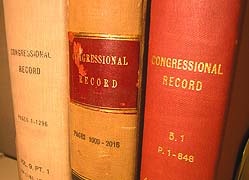The Central Library of the Fulton County Library System is a Federal Depository Library. It was nominated in 1880 by Nathaniel Job Hammond, a predecessor of John Lewis and our current U.S. Representative, Nikema Williams, in representing the Fifth District. Hammond was originally from Elbert County and a drafter of the revised post-Civil War Georgia state constitution who was returned to Congress four times. Central's is now the oldest surviving depository in Georgia and the only one located in a public library instead of a university or special library. So what’s in it for you?
In a time when "government publications" mostly meant those published by Congress, funding had to be approved for the printing of each copy of each title. Not many people outside of Congress could view them. Some newspapers published a digest of the top items in the newspaper, opens a new window when Congress was in session, but otherwise it wasn't easy for the public to have access to key Congressional publications.
In 1858, Congress provided for each Representative to designate a depository library to receive publications of Congress and government agencies. In Atlanta, the designee for the Fifth District was a subscription library, the Young Men’s Library Association of Atlanta, which later became a free library, the Carnegie Library of Atlanta, opens a new window.
 One of the most popular early Federal publications was the daily Congressional Record, in which one could read verbatim the words of those sent to Washington by the people. It’s still pretty entertaining at times. Other than Congressional publications, other early reports authorized to be printed and disseminated by Congress were the annual report of the Department of Agriculture (which would have included reports of the Weather Bureau, food safety, and marketing) and the multivolume The War of the Rebellion: a Compilation of the Official Records of the Union and Confederate Armies.
One of the most popular early Federal publications was the daily Congressional Record, in which one could read verbatim the words of those sent to Washington by the people. It’s still pretty entertaining at times. Other than Congressional publications, other early reports authorized to be printed and disseminated by Congress were the annual report of the Department of Agriculture (which would have included reports of the Weather Bureau, food safety, and marketing) and the multivolume The War of the Rebellion: a Compilation of the Official Records of the Union and Confederate Armies.
In segregated Atlanta, it would not have been easy for African-American readers to consult these documents, though there is evidence that accommodation sometimes was made by individual librarians. But one of the results of Hammond's 1880 action is that today, all residents of the city of Atlanta, Black and white, have inherited a collection that covers nearly every agency of the government, including some agencies no longer in existence. Even though some of these publications have since been digitized and can be found online, many others have not. And sometimes it's just cool to hold in your hand a copy of the same book delivered to an elected representative's office long ago.
One collection, that of the U.S. Civil Rights Commission, was moved to the Auburn Avenue Research Library branch in 2018 as Central closed for renovation. Thousands of government documents are cataloged in the library catalog and others in the Catalog of Government Publications, opens a new window (CGP). You can try DiscoverGov, opens a new window, a one-stop search engine that retrieves reports, articles, and citations across multiple U.S. Federal Government databases including the CGP and GovInfo. The library also maintains webpages, opens a new window and blogs, opens a new window to help the public find digital documents by topic. Government documents are frequently the source of news stories. By law, each federally-designated depository must retain one staff person to help the public find and gain access to these documents, so if you ever hear about a Federal government publication you can't find yourself, contact the Ask-A-Librarian service, opens a new window for help.


Add a comment to: Federal Government Depository Library: What’s In It For You?